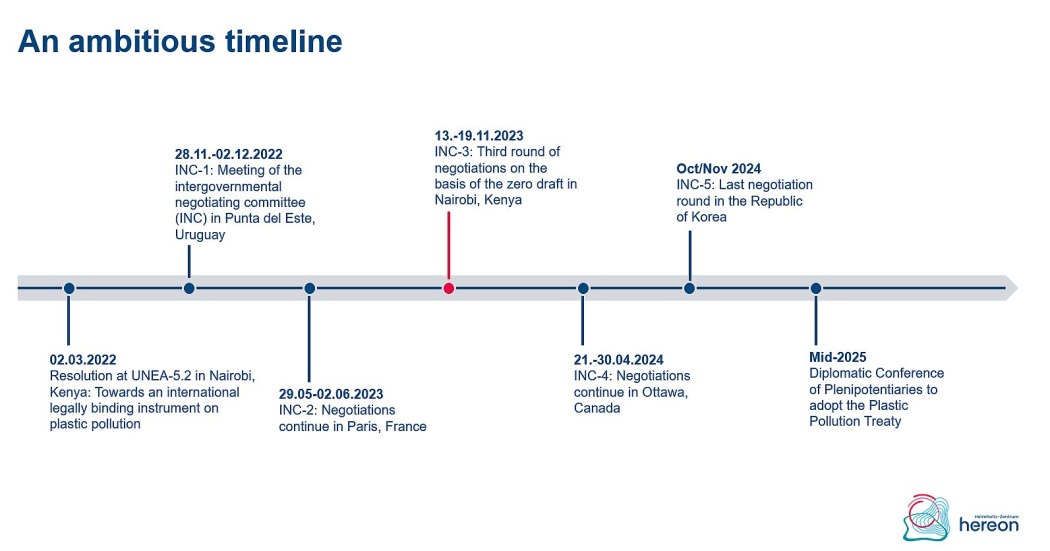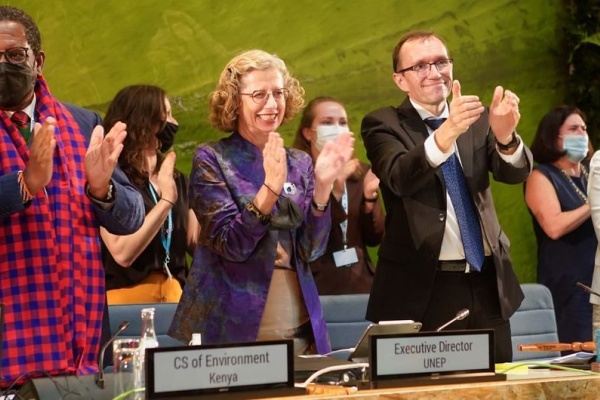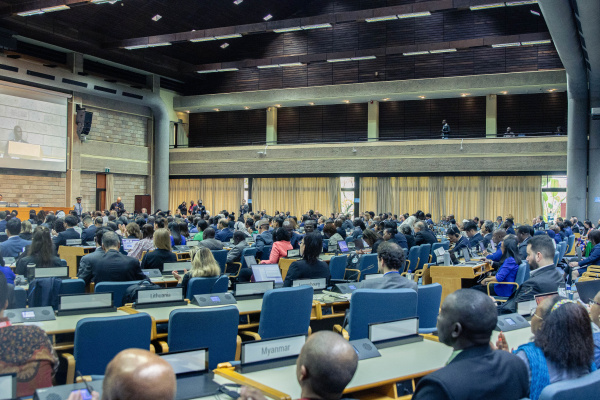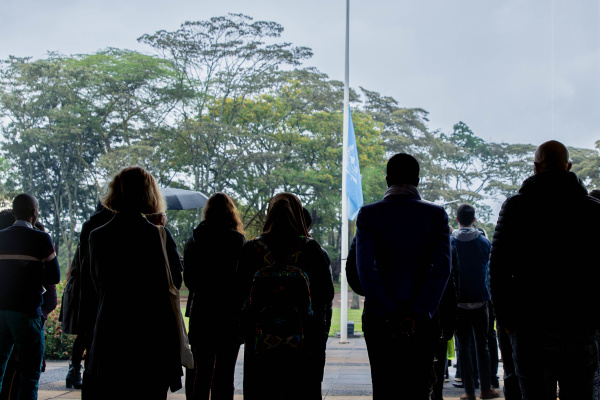The Path to a Global Plastics Treaty
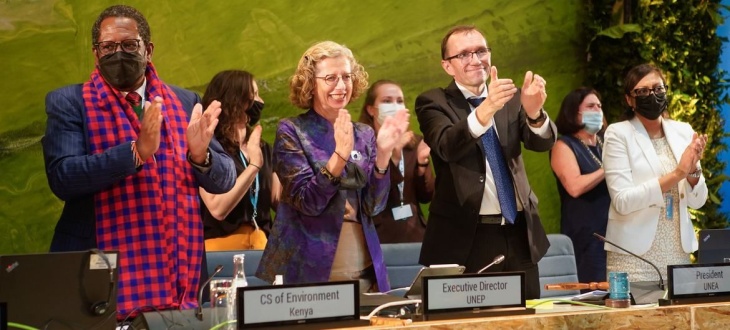
Applause on the podium as the resolution on plastic is passed in Nairobi on March 2, 2022: Keriako Tobiko, then the Kenyan Cabinet Secretary for Environment and Forestry, UNEP Executive Director Inger Andersen and UNEA President Espen Barth Eide (left to right). Image credit: UNEP/ Cyril Villemain, CC BY-NC-SA 2.0 DEED
The world is on an ambitious timeline to tackle plastic pollution. In the spring of 2022, delegates from countries around the world made a historic decision at the United Nations Environmental Assembly (UNEA) in Nairobi, Kenya: To negotiate an internationally and legally binding instrument to tackle plastic pollution and finalize it within just three years. The plan is to adopt the global plastics treaty in mid-2025 at the Conference of Plenipotentiaries.
Since the Nairobi decision, country delegates and plastic pollution experts have met for several rounds of negotiations. Following preparations in Dakar, Senegal, the meetings of the Intergovernmental Negotiations Committee (INC) launched in November 2022 in Punta del Este, Uruguay (INC-1), and continued in Paris, France (INC-2), in May 2023.
A binding global agreement to tackle plastic pollution
The new plastics treaty will address the full lifecycle of plastics, including their production, design and disposal. At the Paris meeting, it was decided to prepare a first draft for the new treaty. This 31-page-long zero draft contained potential measures to tackle plastic pollution and was released on September 4. The zero draft was the basis for discussion at the third meeting, the INC-3, in Nairobi in November. Key elements of the zero draft text for the plastics treaty included:
• regulating plastic polymers, chemicals, single-use plastics and microplastics
• innovating product design and materials, such as non-plastic alternatives
• applying the concept of extended producer responsibility
• waste management and the trade of chemicals, polymers, and waste
• dealing with existing plastic pollution, like in the marine environment
• the fair and just transition for affected populations such as waste workers
• transparency, financing, capacity building, and technology transfer
What's at stake?
Plastic pollution is a growing environmental, social, economic and health issue. In many countries, waste management systems can’t keep up with the growth in plastic waste – and much of it ends up in the environment, in soil, rivers, lakes, oceans and the air. Only 10 percent of plastic waste produced between 1950 and 2018 were recycled. 14 percent were incinerated, and 76 percent ended up in landfills, dumps or the natural environment.
A recent report based on the AWI Litterbase has revealed the extensive impacts of plastic pollution on ocean ecosystems. The investigation uncovered the effects on marine life, with thousands of affected species recorded in the ocean alone. The research was carried out by the Alfred Wegener Institute for Polar and Marine Research commissioned by the World Wildlife Fund. Animals in other environments, such as on land or in rivers, are also affected by the presence of plastics and their associated chemicals. The impacts of plastic pollution on human health have been a growing subject of research in recent years.
Plastic products are composed not only of synthetic polymers, but also of thousands of additives and chemicals, some of which can be toxic. A number of these chemicals are endocrine disruptors, which can interfere with the hormone systems of living beings. Plastic and chemical pollution are now considered aplanetary boundary threat.
Since plastic pollution is a transboundary phenomenon with impacts from production to consumption to disposal, it is important for countries around the world to unite and agree on a global treaty to stop plastic pollution.
Voices from the science
“We already know a lot about the negative impacts of plastics in the environment, but we now need an international global treaty which focuses on the social dimensions of plastics and which really foregrounds the way in which plastics are embedded within society. This is our unique opportunity to really redefine our relationship with plastics. We know that technical solutions are not likely to be sufficient to solve this problem so interdisciplinary approaches which combine the natural, the physical, the social sciences as well as humanities can work in combination to give us a more holistic approach. This can help to identify solutions, but also identify potential obstacles to policies.”
Lesley Henderson, University of Strathclyde, UK
"I would like to see plastic production reduced to the bare minimum, truly essential plastics, that cannot be produced from other materials. Then I would like to see only harmless chemicals used for conventional and bioplastics. So that this very little plastic that is really necessary can readily be reused or recycled in a circular economy. At the moment plastic products probably contain over 16,000 chemicals, of which at least 1/4 are harmful to health, for many others we lack that information. So we definitely have to move away from that. And as a third wish, I would like to see the removal of subsidies for the production of fossil plastics. In general, we really need a systemic change so that the true costs of products are reflected in their price, rather than industries profiting but externalising environmental and health costs to society."
Melanie Bergmann, Alfred Wegener Institute, Helmholtz Centre for Polar and Marine Research, Germany
"The problem with plastic is a wicked problem, an issue that is incredibly hard to solve. For instance, plastic is not one thing - we are talking about very many different materials. Our research shows that everyday plastic products have very unique chemical compositions. It's a complexity problem. While it is complicated, I would also say that the problem is actually quite simple. We take fossil resources, oil and natural gas, we make an awful lot of stuff from it, which we use for an awful short time, which then becomes waste, which has to go somewhere. We end up using petroleum in a solid form for a very short time and throw it away. And that's the problem."
Martin Wagner, Norwegian University of Science and Technology, Norway
“I want to see a more robust inclusion of waste workers and recyclers within the treaty negotiations and within collaborative partnerships that might come out of these talks at various scales of policy and practice. Waste workers are at the frontline handling these most hazardous chemical cocktails that accumulate at the end of the plastics value chain. Therefore, they are most intensely exposed every day to the suite of risks that plastic pollution engenders. They are truly entitled to a voice at the highest level.”
Tridibesh Dey, University of Aarhus, Denmark
“My main plea for the plastics treaty is that we adopt an evidence-based approach to guide us on solutions, we need the same quality of evidence that we relied on in defining the environmental problem itself. We need that evidence to make sure that the solutions we adopt actually work, and we need it to avoid unintended consequences.”
Richard Thompson, University of Plymouth, UK
"In Malaysia, we experience that plastic waste is being imported to our country, classified for recycling. But we find that it’s waste that cannot be recycled. It seems we are receiving waste to be dumped in our country, on our land. To protect the environment and human health, we need to control the transboundary movement of hazardous waste plastic from one country to the other, reduce or replace single plastic usage and control the booming recycling waste industry or facility that does not treat plastic waste appropriately so that it ends up being disposed near water sources and pollutes them.“
Sharifah Norkhadijah Syed Ismail, Universiti Putra, Malaysia
"I am convinced that there will still be a plastic world in 2050, because plastic is used in many useful ways. It is not demonised as a product, even by those who advocate a very ambitious plastics agreement. But there will be less plastic, especially less unnecessary and avoidable plastic. I hope that there will be fewer chemicals in plastic, especially fewer harmful chemicals, because that is actually one of the main causes of the damage to health caused by plastic, all the additives that are still in there. Hopefully, there will then also be lower quantities of newly produced plastic. This means that not too much oil and gas will be extracted from the earth for plastic production. This will also prevent CO2 emissions, which also contributes to climate change mitigation."
Per-Olof Busch, Adelphi, Germany
